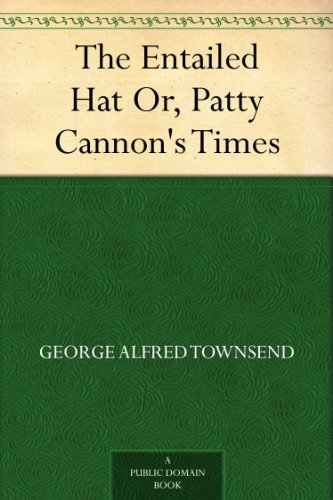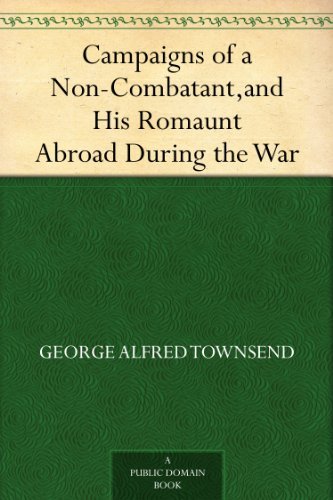-
Aesop's Fables
Aesop, George Fyler Townsend
Paperback (Independently published, Nov. 26, 2019)Aesop's Fables, or the Aesopica, is a collection of fables credited to Aesop, a slave and storyteller believed to have lived in ancient Greece between 620 and 564 BCE.
-
The Entailed Hat Or, Patty Cannon's Times
George Alfred Townsend
eBookNone
-
Campaigns of a Non-Combatant,and His Romaunt Abroad During the War
George Alfred Townsend
eBookNone
-
Bohemian Days Three American Tales
George Alfred Townsend
eBookThis book was converted from its physical edition to the digital format by a community of volunteers. You may find it for free on the web. Purchase of the Kindle edition includes wireless delivery.
-
Aesop's Fables
Aesop, George Fyler Townsend
eBook (Digireads.com, March 30, 2004)If you have ever heard phrases like, "look before you leap," "necessity is the mother of invention," or "two wrongs don't make a right," you are not alone. These phrases and many like them, which have become so commonplace, were first coined by Aesop. Born into slavery in ancient Greece, Aesop supposedly won his freedom with his learned wit. Collected here are his famous fables translated by George Fyler Townsend with a short biography of Aesop and a preface to the fables.
-
Aesop's Fables
Aesop, George Fyler Townsend
eBook (, July 15, 2020)As legend has it, the storyteller Aesop was a slave who lived in ancient Greece during the sixth century B.C. His memorable, recountable fables have brought amusing characters to life and driven home thought-provoking morals for generations of listeners and modern-day readers. Translated into countless languages and familiar to people around the world, Aesop's fables never tarnish despite being told again and again. Full of humor, insight, and wit, the tales in Aesop's Fables champion the value of hard work and perseverance, compassion for others, and honesty. They are age-old wisdom in a delicious form, for the consumption of adults and children alike.
-
The Classic Treasury of Aesop's Fables
Aesop, George Fyler Townsend
Paperback (CreateSpace Independent Publishing Platform, Dec. 5, 2014)Get in step with the colorful animals that race, waddle, and leap through these pages! From a fast-footed monkey to a two-timing fox, each creature has a story to tell and a moral to teach. These famous tales tickle the imagination and teach simple truths, ones that children and adults face every day. Inside are twenty classic fables, including The Tortoise and the Hare, The Goose Who Laid the Golden Eggs, and The City Mouse and the Country Mouse. Passed from generation to generation, Aesop's best-loved fables are presented here that bring these naughty, bold, brave, and lovable creatures to life.
-
Aesop's Fables
Aesop, George Fyler Townsend
Paperback (CreateSpace Independent Publishing Platform, June 1, 2016)Aesop's Fables is a collection of stories credited to Aesop, a slave and storyteller believed to have lived in ancient Greece between 620 and 564 BCE. Of diverse origins, the stories associated with Aesop's name have descended to modern times through a number of sources and include such favorites as The Fox and the Grapes, The Tortoise and the Hare, The Farmer and the Stork, The North Wind and the Sun, The Ant and the Grasshopper and hundreds more.
-
Aesop's Fables
Aesop, George Fyler Townsend
Paperback (Independently published, July 23, 2020)Aesop's Fables, or the Aesopica, is a collection of fables credited to Aesop, a slave and storyteller believed to have lived in ancient Greece between 620 and 564 BCE. Of diverse origins, the stories associated with his name have descended to modern times through a number of sources and continue to be reinterpreted in different verbal registers and in popular as well as artistic media.The fables originally belonged to the oral tradition and were not collected for some three centuries after Aesop's death. By that time a variety of other stories, jokes and proverbs were being ascribed to him, although some of that material was from sources earlier than him or came from beyond the Greek cultural sphere. The process of inclusion has continued until the present, with some of the fables unrecorded before the Late Middle Ages and others arriving from outside Europe. The process is continuous and new stories are still being added to the Aesop corpus, even when they are demonstrably more recent work and sometimes from known authors.
-
AESOP'S FABLES
AESOP, George Fyler Townsend
language (, May 31, 2020)Aesop's Fables, or the Aesopica, is a collection of fables credited to Aesop, a slave and storyteller believed to have lived in ancient Greece between 620 and 564 BCE. Of diverse origins, the stories associated with his name have descended to modern times through a number of sources and continue to be reinterpreted in different verbal registers and in popular as well as artistic media.The fables originally belonged to the oral tradition and were not collected for some three centuries after Aesop's death. By that time a variety of other stories, jokes and proverbs were being ascribed to him, although some of that material was from sources earlier than him or came from beyond the Greek cultural sphere. The process of inclusion has continued until the present, with some of the fables unrecorded before the Late Middle Ages and others arriving from outside Europe. The process is continuous and new stories
-
Aesop's Fables
Aesop, George Fyler Townsend
language (Wisehouse Classics, Nov. 2, 2015)AESOP'S FABLES or the AESOPICA is a collection of fables credited to Aesop, a slave and storyteller believed to have lived in ancient Greece between 620 and 560 BCE. Of diverse origins, the stories associated with Aesop's name have descended to modern times through a number of sources. They continue to be reinterpreted in different verbal registers and in popular as well as artistic media.The fables were in the first instance only narrated by Aesop, and for a long time were handed down by the uncertain channel of oral tradition. Socrates is mentioned by Plato as having employed his time while in prison, awaiting the return of the sacred ship from Delphos which was to be the signal of his death, in turning some of these fables into verse, but he thus versified only such as he remembered. Demetrius Phalereus, a philosopher at Athens about 300 B.C., is said to have made the first collection of these fables. Phaedrus, a slave by birth or by subsequent misfortunes, and admitted by Augustus to the honors of a freedman, imitated many of these fables in Latin iambics about the commencement of the Christian era. Aphthonius, a rhetorician of Antioch, A.D. 315, wrote a treatise on, and converted into Latin prose, some of these fables. This translation is the more worthy of notice, as it illustrates a custom of common use, both in these and in later times. The rhetoricians and philosophers were accustomed to give the Fables of Aesop as an exercise to their scholars, not only inviting them to discuss the moral of the tale, but also to practice and to perfect themselves thereby in style and rules of grammar, by making for themselves new and various versions of the fables. Ausonius, the friend of the Emperor Valentinian, and the latest poet of eminence in the Western Empire, has handed down some of these fables in verse, which Julianus Titianus, a contemporary writer of no great name, translated into prose. Avienus, also a contemporary of Ausonius, put some of these fables into Latin elegiacs, which are given by Nevelet (in a book we shall refer to hereafter), and are occasionally incorporated with the editions of Phaedrus. Seven centuries elapsed before the next notice is found of the Fables of Aesop... (more at wisehouse-classics.com)
-
Aesop's Fables
Aesop, George Fyler Townsend
eBook (, July 7, 2020)As legend has it, the storyteller Aesop was a slave who lived in ancient Greece during the sixth century B.C. His memorable, recountable fables have brought amusing characters to life and driven home thought-provoking morals for generations of listeners and modern-day readers. Translated into countless languages and familiar to people around the world, Aesop's fables never tarnish despite being told again and again. Full of humor, insight, and wit, the tales in Aesop's Fables champion the value of hard work and perseverance, compassion for others, and honesty. They are age-old wisdom in a delicious form, for the consumption of adults and children alike.